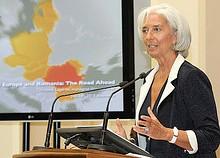
Typical street scene in Santa Ana, El Salvador. (Photo: iStock)
IMF Survey : Integration Offers Path to Prosperity in Eastern Europe, Says Lagarde
July 19, 2013
- Lagarde wraps up visits to Romania, Lithuania
- Stresses power of integration to help achieve lasting growth and job creation
- Continued policy reforms, structural improvements needed to boost competitiveness
The countries of Eastern Europe can build strong, dynamic economies by pursuing closer economic ties with each other and with the rest of Europe, IMF Managing Director Christine Lagarde said during a July 15-18 trip to Romania and Lithuania.

Speaking at the National Bank of Romania, Lagarde emphasized further advancing structural reforms to support growth and job creation (IMF photo)
LAGARDE IN EASTERN EUROPE
Lagarde’s visit, her first to these countries as head of the IMF, comes at a time when potential growth across the region has slowed substantially in the wake of the crisis, from over 5 percent in 2007 to less than 2½ percent in 2012, and when policymakers in the region are searching for ways to secure a sustained and robust recovery for their economies.
Her visit to Romania included meetings with the country’s leaders, parliamentarians, and civil society—including business and women leaders—as well as a speaking engagement in Bucharest at the conference, ''Eastern Europe and Romania: The Path to Prosperity,” hosted by the National Bank of Romania. In Lithuania, she met with the country’s leaders and took part in a panel discussion on European Economic Integration: Taking Stock of Challenges and Opportunities.”
Seizing the opportunity of integration
“I firmly believe that integration is a big opportunity and the right future for Eastern Europe,” Lagarde said during the Bucharest speech, and reminded that integration and reform delivered rapid growth in Eastern Europe between 1995 and 2007.
Lagarde acknowledged that integration also carries risks, referring to the “heavy losses” for the countries, and people, of the region after the crisis hit in 2008. “The lesson is certainly not to turn your backs on European integration,” she underscored, noting that the region can harness the power of integration to achieve lasting growth and job creation. “Above all, the path to greater prosperity requires determination. If the crisis tells us anything, it is that policy actions take time to create change and generate growth.”
Moving to a higher growth path
Lagarde emphasized three key policy areas that would help countries in the region achieve lasting growth and job creation:
• Ensuring macroeconomic stability by building on fiscal achievements to date;
• Advancing structural reforms to boost competitiveness; and
• Improving social protection and sharing the burden of adjustment fairly.
Turning to Romania, Lagarde commended the reforms taken over the past several years to begin “chipping away at the barriers to higher growth.” She highlighted, in particular, the steps taken to gradually liberalize energy prices. But to ensure growth is lifted to a higher plane, Lagarde emphasized more progress to enhance the investment climate, such as improving the quality of energy and transportation infrastructure, by enhancing the viability of state-owned entities. She also noted the importance of increasing absorption of structural funds and repairing bank balance sheets in promoting growth.
While in Bucharest, the IMF chief met with President Traian Basescu; Prime Minister Victor Ponta; Deputy Prime Minister and Minister of Public Finance Daniel ChiÅ£oiu; Minister Delegate of Budget, Liviu Voinea; and Central Bank Governor Mugur Isarescu. She congratulated the President and the authorities on the strides Romania has taken to transform its institutions and strengthen decision-making with EU membership. She also pointed to the country’s successful economic stabilization after the crisis, and to the IMF’s partnership with Romania, providing both financial and technical support along the way.
An inclusive Europe
European integration was also a central theme of Lagarde’s visit to Vilnius, Lithuania. The visit took on added significance with the growing leadership role of Eastern European countries, coinciding with Lithuania having just taken over the EU presidency (July 1) from Ireland. The visit provided an opportunity to discuss with President Dalia GrybauskaitÄ—, as well as with Prime Minister Algirdas ButkeviÄius; Minister of Finance Rimantas Šadžius; and Chairman of the Board of the Bank of Lithuania Vitas Vasiliauskas, their priorities for the presidency. Lagarde welcomed Lithuania’s focus on “developing a banking union framework” and a “stronger Single Market policy” under the three pillars of a credible, growing, and open Europe. The IMF head also welcomed Lithuania’s objective to adopt the euro in 2015, as the next logical step, saying it would reduce borrowing costs and further strengthen financial stability.
At a panel discussion at Vilnius University, Lagarde commended Lithuania’s astute crisis management and decisive policies that restored credibility, saying it will be important to hold on to the “hard-won gains in competitiveness and public finances”. Speaking at the panel with European Central Bank Executive Board Member Jörg Asmussen and with Lithuania’s Finance Minister Šadžius, and Governor Vasiliauskas, she said that successful structural reforms required political leadership, public support and "hard negotiation" among political players. Job creation “is ultimately the key question for any politician, for any family” she said.


